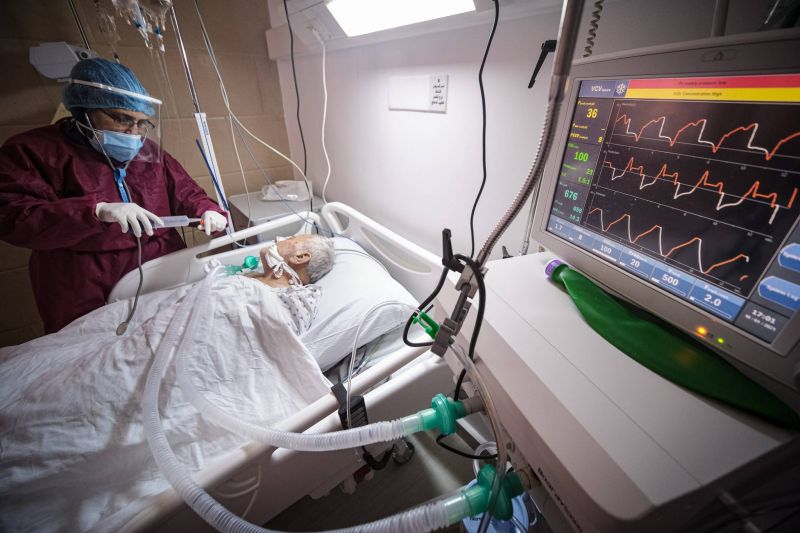
A health worker treats a COVID-19 patient at Sibline Governmental Hospital. (Credit: João Sousa/L’Orient Today)
BEIRUT — Lebanon began a new week of strict COVID-19 lockdown on Monday with no respite from the surge in hospitalizations and deaths, while protests persisted in the country’s second city of Tripoli.
Fifty-four more people died in the last 24-hour period, bringing the death toll to 2,404, while equally grim ICU hospitalization numbers keep rising — up to 930 in the latest count on Monday.
“We have some room in the ER but our COVID-19 beds are fully occupied,” Bernadette Achy — the nursing supervisor at Rizk Hospital in Beirut — told L’Orient Today.
The crisis extends beyond the densely populated capital and surrounding areas. Nabatieh Governmental Hospital’s coronavirus facility is operating at full capacity, according to hospital supervisor Hassan Baz.
“We have 18 patients in the regular coronavirus ward and another 11 in the ICU,” he said, adding that two patients are currently waiting in the ER to be admitted or transferred to another hospital.
Meanwhile, the spokesperson for Haykel Hospital in Tripoli said three patients were receiving treatment in the ER, with the facility’s capacities stretched even further Monday than the day before.
“We’re almost operating at full capacity, with six patients in the ICU and 46 in the regular ward,” Jinane Bakkour told L’Orient Today.
The surge has pushed hospitals to their limits, with Firass Abiad, the general manager of Rafik Hariri University Hospital, tweeting Monday morning that Lebanon’s “ICU bed occupancy is currently at 94.4 percent.”
The average positivity rate for COVID-19 tests over the past week was 22.3 percent, he said, signaling that despite “good compliance, there is scant evidence that the spread is decreasing.”
While the lockdown showed signs of cracks over the weekend, footfall and vehicular traffic — at least in Beirut — was relatively sparse throughout Monday, marking almost two weeks since the introduction of Lebanon’s toughest countrywide lockdown to date.
The lockdown, extended until Feb. 8, has sparked sporadic protest by people suffering from rapidly deteriorating living conditions exacerbated by the strict curtailment of commerce.
In Tripoli, dozens gathered on Monday in Al Nour Square, an iconic protest site of the Oct. 17 uprising, demanding an end to the lockdown, which has left many businesses closed or operating at reduced capacity amid a 24-hour curfew and delivery-only services for food stores and restaurants.
Others set tires alight and cut off a road leading to the port city. In the evening, a group of demonstrators pelted the city’s serail, the headquarters of the North Lebanon Governorate, with rocks, prompting security forces to intervene.
Residents of Saida organized a similar march, decrying an economic collapse that has, according to UN estimates, pushed over half the country into poverty.
The expected start of a vaccine rollout next month has offered a glimmer of hope to the otherwise bleak situation. The process, however, has already hit a technical glitch.
The platform for registering people for the vaccine, expected to launch Monday, was pushed back a day, the chair of Parliament’s health committee, MP Assem Araji (Future/Zahle), told L’Orient Today.
The first batch of vaccine doses, estimated at around 60,000 from pharma giant Pfizer, is expected to arrive as early as the first week of February.
After registering, residents will be selected to receive the vaccine based on age and medical history, Araji said, with priority given to those above 74 years of age and health care workers.
They will then be redirected to one of the 42 hospitals approved to administer COVID-19 vaccines once they become available. Geographically, nine approved hospitals are in Beirut, 11 in Mount Lebanon, 11 in the north, six in the south and five in the Bekaa Valley.